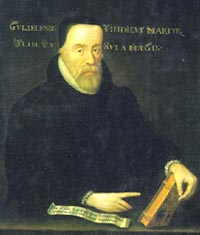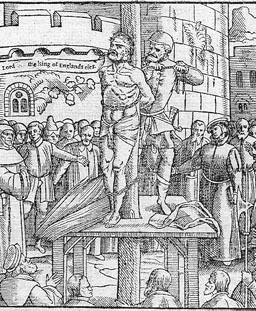Giving Thanks for God's Word
I thought that no man had been so blind to ask why light should be showed to them that walk in darkness, where they cannot but stumble, and where to stumble is the danger of eternal damnation.—William Tyndale A Pathway into the Holy Scripture, 1531.
 When he penned the lines above, Tyndale (1494-1536) was on the run, a criminal chased across Europe carrying out his illicit project on the sly in borrowed rooms, living under an assumed name. His crime was attempting to place the words of scripture into everyone's hands in a language they could understand. The main charge against him was his ever nearing completion on the first complete translation of the Old and New Testaments into contemporary English. He was tracked like a terrorist for daring to dream that every person might hear God's word in their own language and that all who could read would be allowed to read it for his or herself.
When he penned the lines above, Tyndale (1494-1536) was on the run, a criminal chased across Europe carrying out his illicit project on the sly in borrowed rooms, living under an assumed name. His crime was attempting to place the words of scripture into everyone's hands in a language they could understand. The main charge against him was his ever nearing completion on the first complete translation of the Old and New Testaments into contemporary English. He was tracked like a terrorist for daring to dream that every person might hear God's word in their own language and that all who could read would be allowed to read it for his or herself.Tyndale's work was a race against time with the kings of Europe allied against him. His life reads like a thriller. See the following sample from his life at The Tyndale Society
Realising he could not translate the Bible in England, Tyndale accepted the help of a London merchant and went to Germany in 1524. He never returned to England, but lived a hand-to-mouth existence, dodging the Roman Catholic authorities. In 1525, he and his secretary moved to Cologne, Germany and began printing the New Testament.
But Tyndale was betrayed, and fled up the Rhine to Worms. Here he started printing again, and the first complete printed New Testament in English appeared in February 1526. Copies began to arrive in England about a month later. In October, Tunstall had all the copies he could trace gathered and burned at St Paul's Cross in London. Still they circulated.
Tunstall arranged to buy them before they left the continent, so that they could be burned in bulk. Tyndale used the money this brought him for further translation and revision. At the same time, he wrote polemical treatises and expositions of the Bible.
He began the Old Testament, apparently in Antwerp: Foxe tells how, sailing to Hamburg to print Deuteronomy, he was shipwrecked and lost everything, 'both money, his copies, and time', and started all over again, completing the Pentateuch between Easter and December.
Back in Antwerp, Tyndale printed it in early January, 1530. Copies were in England by the summer. Revisions and shorter translations followed.
 Tyndale was betrayed by a friend, Philips, the agent either of Henry or of English ecclesiastics, or possibly of both. Tyndale was arrested and imprisoned in the castle of Vilvoorden for over 500 days of horrible conditions. Then on the morning of October 6, 1536 William Tyndale was tied to the stake, strangled and burned. His last words were: "Oh Lord, open the King of England's eyes."
Tyndale was betrayed by a friend, Philips, the agent either of Henry or of English ecclesiastics, or possibly of both. Tyndale was arrested and imprisoned in the castle of Vilvoorden for over 500 days of horrible conditions. Then on the morning of October 6, 1536 William Tyndale was tied to the stake, strangled and burned. His last words were: "Oh Lord, open the King of England's eyes."Though his life was given, Tyndale's prayers were answered and Henry VIII printed The Great Bible within three years, which placed the scripture in English in every church of his realm.
Tyndale's influence on the English language was greater than anyone. Tyndale was a pioneer in the use of ordinary language for poetic aphorism. He penned well known phrases in his translation work including
"in him we live and move and have our being,"
"fight the good fight,"
"my brother's keeper,"
"the salt of the earth,"
"filthy lucre,"
"the signs of the times,"
"the powers that be,"
"a law unto themselves,"
and many more phrases through which we have come to know God's Word by way of Tyndale's English. This is because the esteemed committee which created the venerable King James Version kept 85% of Tyndale's work.
Every American household with its average of 2.2 Bibles has William Tyndale to thank. Whether those Bibles are well worn and much loved, or sit gathering dust, Tyndales gave his life willingly so that we might have such open access to God's Word. Thanks be to God for Tyndale's faithfulness unto death.







0 Comments:
Post a Comment
<< Home